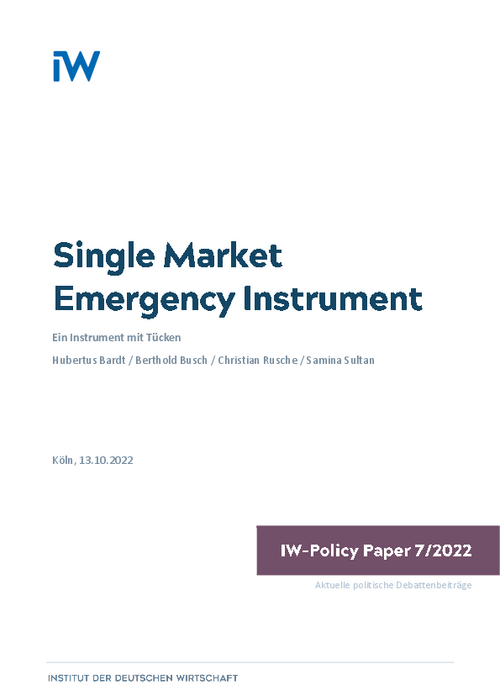The Single Market is one of the most important achievements of the European Union (EU) and it contributes significantly to economic welfare. In fact, most of the international trade of the Member States takes place in the Single Market.

Single Market Emergency Instrument – An instrument with pitfalls

The Single Market is one of the most important achievements of the European Union (EU) and it contributes significantly to economic welfare. In fact, most of the international trade of the Member States takes place in the Single Market.
However, at the beginning of the 2020 Corona Pandemic, measures were taken that restricted the free movement of goods, services and people. This made it clear that the Single Market is vulnerable and cannot be taken for granted. Furthermore, reduced imports from Russia as a result of the Russian assault on Ukraine have also shown that the EU is partly dependent on supplies from third countries. These dependencies also exist with the People's Republic of China.
Against the background of pandemic and war, the European Commission presented its proposal for a Single Market Emergency Instrument (SMEI) on September 19, 2022. The SMEI aims both at maintaining the Single Market in times of crisis and at supplying the member states, and thus the population, with goods and services affected by a crisis. Maintaining the internal market in times of crisis is very much to be welcomed. In contrast to this are far-reaching competencies for the European Commission for emergencies, which enable dirigiste interventions in the market and thus at least partially invalidate market coordination via the Single Market. This raises the fundamental question of whether the adaptability of decentralized control processes via markets is actually insufficient in times of crisis and must be replaced or supplemented by government requirements. Crisis situations are characterized by particular scarcities - and the efficient handling of scarcities is precisely one of the great strengths of market prices. Thus, if a good can be produced and prices rise accordingly, the potential supplier will use this option. The Corona crisis showed that there was successful and rapid vaccine development due to private entrepreneurial decisions and initiatives that were supported by adequate government framework conditions. Direct state intervention, on the other hand, was not crowned with success. Direct instructions to prioritize the production of certain goods can have unintended consequences: Without strict self-commitment, there is a risk that these war economy structures - with private ownership but state control - will be viewed as normal political instruments. In addition, such measures do not help to break dependencies on third countries in times of crisis.

Single Market Emergency Instrument – An instrument with pitfalls

More on the topic
![[Translate to English:] Das Gebäude des Weißen Hauses in Washington, D.C. in den Vereinigten Staaten von Amerika. [Translate to English:] Das Gebäude des Weißen Hauses in Washington, D.C. in den Vereinigten Staaten von Amerika.](/fileadmin/_processed_/c/1/csm_GettyImages-2161499385_White_House_Editorial_884306add8.jpg)
Trump or Harris or ...? What Europe must prepare for
A few months before the presidential election in the USA, Donald Trump has a good chance of being re-elected. On the Democratic side, the incumbent president has withdrawn his candidacy after a long period of hesitation, while Vice President Kamala Harris is ...
IW
Compendium 5.5: CO2 Regulation of Road Transport in Europe
With the Compendium CO2 Regulation in Europe, the IW has been providing the interested public with a comprehensive collection of data on the development of CO2 emissions from passenger car traffic in the European Union, as well as on the applicable regulatory ...
IW